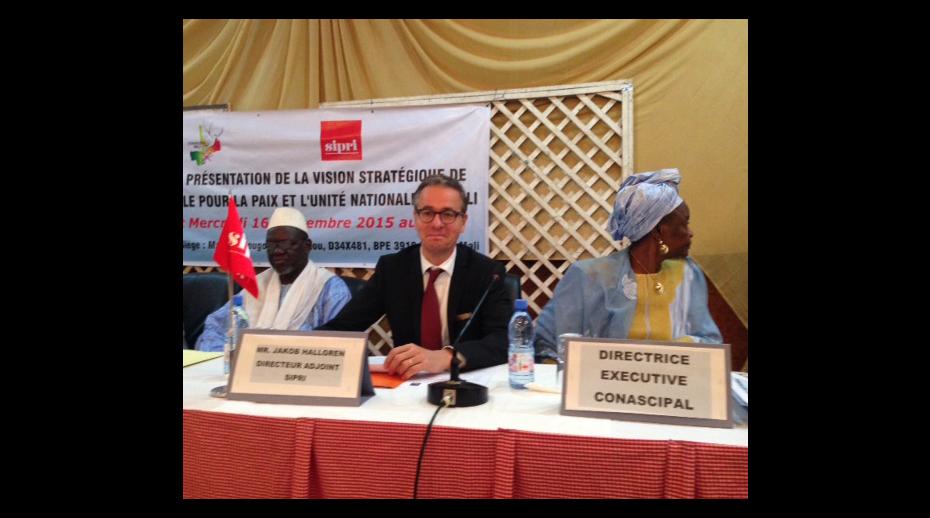
15 September 2015, Bamako, Mali
The impact of the Malian crisis, which began in January 2012 with a surge of armed violence in northern Mali, is felt across the country. While a peace accord was signed on 15 May and 20 June 2015, its implementation is faced with serious challenges. Achievement of a lasting peace will require commitment and contributions from a number of actors at all levels of Malian society.
In light of civil society's important role in peacebuilding, SIPRI has been supporting a process together with CONASICPAL, an umbrella organization for civil society organisations (CSOs), to develop a strategic vision for civil society contributions to peace and national unity in Mali. The two partner organisations launched this strategic vision at a seminar in Bamako on 15 September.
Speakers at the seminar included: Mr Asser Kamaté, the Secretary-General of the Malian Ministry of Security and Civil Protection; Mr Attaher Ag Iknane, the Secretary-General of the Malian Ministry for National Reconciliation; H.E. Eva Emnéus, Ambassador of Sweden to Mali; Mr Souleymane Niaré, President of the National Coalition of Civil Society for Peace and the Fight against the Proliferation of Small Arms (CONASCIPAL); and Jakob Hallgren, Deputy Director of SIPRI.
The strategic vision assesses how civil society can contribute to the peace process in Mali, including the objectives of the Agreement for Peace and National Reconciliation. It draws on an evidence-based assessment of the challenges that need to be addressed and how these could be mitigated through increased civil society involvement. The role of civil society in national reconciliation and its participation in political governance figure prominently in the document.
Designed for CSOs and other stakeholders that aim to contribute to the consolidation of peace and national unity in Mali, the strategic vision proposes deep, organised and progressive engagement by Malian civil society. Among others, the document identifies initiatives that would address light arms proliferation, obstacles to social and economic development and religious extremism.
Editorial Information
In order to be shared and discussed across the many diverse communities of Malian society, the document has been translated from French into 12 local languages. The document will also be disseminated by radio and through a series of local consultations so that its potential can be communicated to a broad range of Malian civil society.
The French version of the strategic vision can be downloaded from CONASCIPAL’s website, www.conascipal.org or at the Mali Project’s website at SIPRI, http://www.sipri.org/research/security/mali
To obtain a copy of the strategic vision in one of the local Malian languages, contact CONASCIPAL:
maliconascipal@yahoo.fr
Phone: +223 66669936/ +223 79153935